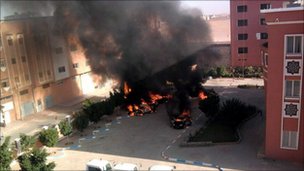Al Qaeda in the Sahara: Don't Create Bogeymen

Fires Burn in Laayoune During Protests: Image Credit – BBC
Two articles appeared in the last few days that caught my attention, both on Al Qaeda: one about Yemen and the other about Morocco and the Western Sahara. The New York Times had a piece last week titled Yemen’s Drive on Al Qaeda Faces Internal Skepticism and The New York Post ran an article on a purported growing presence of Al Qaeda in the disputed territory of the Western Sahara. Both articles, each in a different way, are reminders that in the heat of the conflict with Al Qaeda it would be unwise to let regimes in the region define a broad swath of their opponents as Al Qaeada (so that they can crack down on those opponents without consequences from the West and perhaps get Western support to do so).
The opening paragraphs of the Times article nicely describe the phenomenon as it is playing out in Yemen:
As Yemen intensifies its military campaign against Al Qaeda’s regional arm, it faces a serious obstacle: most Yemenis consider the group a myth, or a ploy by their president to squeeze the West for aid money and punish his domestic opponents.
Those cynical attitudes — rooted in Yemen’s history of manipulative politics — complicate any effort to track down the perpetrators of the recent plot to send explosives by courier to the United States. They also make it harder to win public support for the fight against jihadist violence, whatever label one attaches to it.
And here:
That view, echoed across Yemen, is only partly a conspiracy theory. The Yemeni government has used jihadists as proxy soldiers in the past, and sometimes conflates the Qaeda threat and the unrelated political insurgencies it has fought in northern and southern Yemen in recent years.
The article on the Western Sahara is less nuanced about the links between the Polisario Front in the Western Sahara, Al Qaeda’s North African affiliate (Al Qaeda in the Maghreb) and a string of attacks:
Al Qaeda’s power is surging in North Africa. In recent years it has bombed restaurants in Morocco, attacked police stations in Algeria, tried to sink US warships off Gibraltar and bomb the US embassy in Mali and kidnapped scores of Europeans in the Sahara — extracting more than $20 million in ransom, enough to finance an army here.
It is an army on the move. European intelligence services increasingly find North African links to plots they disrupt.
While the Polisario Front opposes al Qaeda, some 56 Polisario officials and soldiers have been linked to the terrorist group. The lawless wastes of the Sahara are becoming the next Afghanistan.
I do not have any particular insight as to the veracity of the claim that Al Qaeda is becoming enough of a force in the Western Sahara to be a concern. I do wonder about the claim above that “some 56 Polisario officials and soldiers have been linked to [al Qaeda]. Who has made that link? The Moroccan and/or Algerian government? Such conclusions should be based on highly detailed intelligence and careful analysis and I trust that is underway. The U.S. should tread very carefully with regard to such claims; saying it certainly does not make it so.
The Western Sahara has long been a forgotten conflict, stuck in time since 1975, overseen by a UN mission (MINURSO) and largely ignored by most scholars and analysts. But recently there has been increased interest in this issue that has included (and spurred on by) S. E. Cupp’s article last year in Town Hall as well as this piece in the New York Post. The role of American conservatives in taking up this cause (both articles are clearly supportive of the Moroccan position in the Western Sahara) is curious but for others to parse. Morocco and Polisario have long competed for supporters.
But it is not difficult to imagine that Al Qaeda in the Maghreb would see the Western Sahara as a place to be able to recruit and to work against both Morocco and Algeria simultaneously. But that seems largely a symptom of the overall problem in the region and one that can only be solved by solving the status of the territory once and for all. Just today talks resumed in New York (under UN auspices) between Morocco and Polisario while riots broke out in the Western Sahara. The situation cries out for a solution, for so many reasons. Finding a hint of Al Qaeda presence might be true but that should not become the focus of those trying to solve the conflict or the reason for finally doing so.
While it is clear that Al Qaeda exists in North Africa and also in Yemen – and that it remains dangerous in the extreme – conflating that threat with other opponents, threats and actors dilutes the focus of the Al Qaeda hunt. It also gives carte blanche to regimes to engage in the very behavior that fuels support for Al Qaeda (ie, repression of opponents). This is only the latest variation on a long running theme. During the Cold War demonstrating anti-communist, anti-Soviet policies was the key to garnering Western support. The added bonus was being able to label ones’ internal opponents as communists and marginalize them, send them into exile or cart them off to prison. In the 1990s position ones’ regime against the Green Wave of Islamic fundamentalism was the key, and categorizing opponents accordingly followed suit. Now, assisting in the struggle against Al Qaeda is litmus test regimes must meet. But it would be counterproductive for both the West and governments in the region to use that fight as cover for settling every local and regional score possible.
